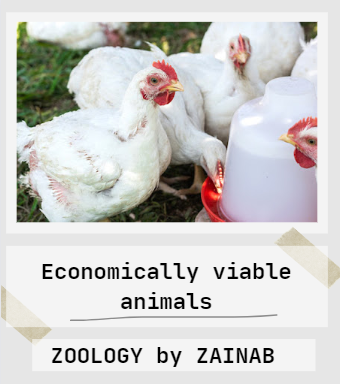Economically viable animals
 |
| Economically viable animals |
The choice of economically
viable animals depends on various factors, including the purpose of raising
the animals (e.g., meat production, milk, fiber, pets), the local market
demand, the resources you have available (such as land, facilities, and
capital), and your knowledge and experience in animal husbandry. Here are some
animals that are generally considered to be economically viable in different
contexts:
1. Broiler Chickens:
.png) |
| Broiler Chickens |
Specifically raised
for meat production, broiler chickens grow quickly and have a high feed-to-meat
conversion rate, making them a common choice for meat production in many
regions.
2. Layers
(Egg-Laying Chickens):
Layers are kept for
egg production. They can generate a steady income from egg sales if managed
well.
3. Dairy
Cattle:
Dairy cows or goats can provide a consistent source of milk,
which can be processed into various dairy products with good market demand.
4. Sheep
and Goats:
.png) |
| Sheep and Goats |
Sheep and goats can
be raised for meat (lamb or goat meat) and, in some cases, for fiber (e.g.,
wool or mohair). They often require less space compared to larger livestock.
5. Pigs:
.png) |
| Pigs |
Pigs can be raised
for pork production, and they have a relatively short growth period compared to
other livestock.
6. Aquaculture
(Fish Farming):
.png) |
| Aquaculture (Fish Farming) |
Fish farming, such as
raising tilapia, catfish, or other suitable species, can be profitable,
especially in areas with high demand for fish.
7. Rabbits:
.png) |
| Rabbits |
Rabbit farming can be
a good option, particularly for meat production, as rabbits reproduce rapidly
and have efficient feed conversion rates.
8. Honeybees:
.png) |
| Honeybees |
Beekeeping for honey
production can be profitable, and it has the added benefit of pollinating
crops.
9. Alpacas
and Llamas:
.png) |
| Alpacas and Llamas |
In some regions,
alpacas and llamas are raised for their wool and as pack animals.
10. Commercial
Quail Farming:
.png) |
| Commercial Quail Farming |
Quails can be raised
for meat and egg production, and they require less space compared to chickens.
Remember that success in animal husbandry depends on proper
management, understanding of the specific needs of the animals, adherence to
biosecurity and animal welfare practices, and a solid understanding of the
local market dynamics. It's essential to thoroughly research the economic
feasibility of raising any specific animal in your particular location and
circumstances.


.png)


.png)
Post a Comment